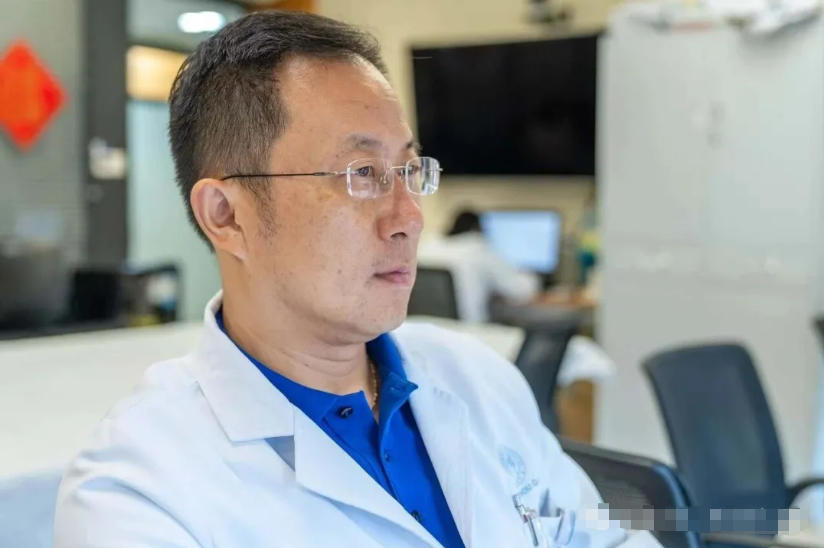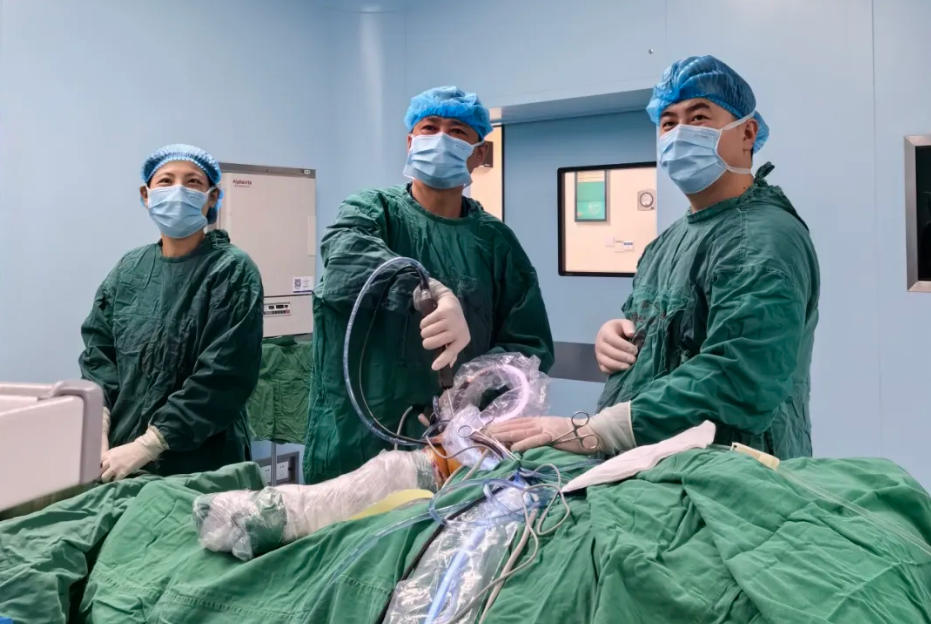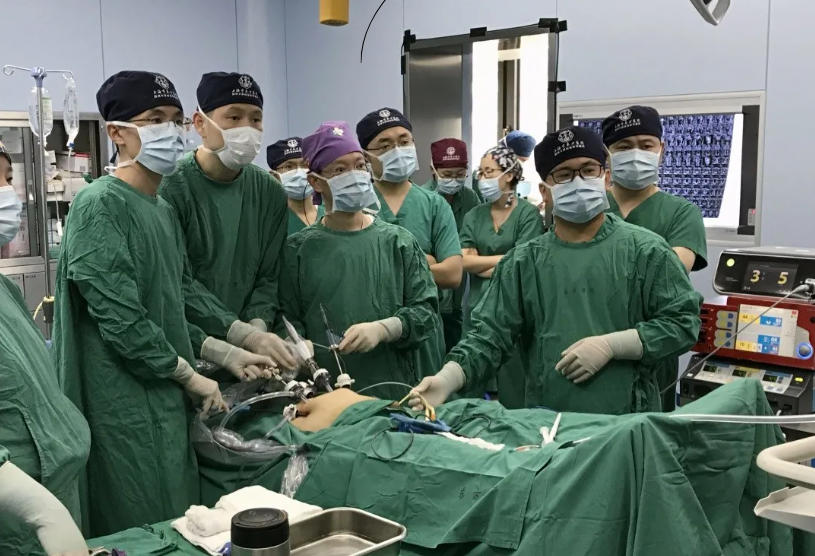Update time:2025-10-19Visits:3271

Xia Qiang,Professor of Organ Transplantation Surgery,Member of the Chinese Academy of Engineering,President of Renji Hospital
Introduction
The liver, the body’s vital organ of life, is where Dr. Xia Qiang fights daily to save others. To him, a patient’s diagnosis does not define them; he sees the hope, future, and dignity that remain. Restoring that hope and helping people reclaim their lives is, to him, the ultimate fulfillment of a physician’s calling.
Dr. Xia is a leading authority on pediatric liver transplantation. A healer and a respected leader, his titles include Chief Physician, Professor, Doctoral Supervisor, and Academician of the Chinese Academy of Engineering. He serves as President and Deputy Party Secretary of Renji Hospital, affiliated with Shanghai Jiao Tong University School of Medicine, and as Director of the Shanghai Research Center for Organ Transplantation and Immunoengineering.
“When we started, the organ shortage was a major barrier, especially for children,” he recalls. “It’s rare to find a donor that matches a young child’s size. I wondered if living-donor transplantation could be the answer. That idea drove our team’s work.”
Over the past decade, his team has given new life to countless patients facing hopeless diagnoses. Through societal compassion and extraordinary surgical skill, miracles of life have unfolded again and again. At the edge of life and death, the impossible becomes possible.
Where It All Began: From Music to Medicine
In the 1960s, Xia Qiang’s parents, both former military officers, moved to Anhui Province. He was born in Anqing, a historic city on the Yangtze River known for its cultural heritage. This rich environment sparked his artistic sensitivity. As a child, family friends nicknamed him “a budding talent for the army’s cultural troupe,” and he became the lead erhu player in his school’s arts group.
“My parents wanted me to explore Western music, too,” Xia recalls. Every summer, he studied violin in Shanghai under his cousin, Xu Weiling, a renowned violinist and professor at the Shanghai Conservatory of Music.
This artistic chapter faded when China reinstated the national college entrance examination (gaokao). Xia set aside his music to focus on academics. Coming from a family of medical professionals and raised in a hospital compound, medicine felt like a natural path. He traded his violin bow for a scalpel, ready to perform a different kind of symphony in the operating room.
In 1982, Xia Qiang was admitted to Anhui Medical University with exceptional scores. His time there laid the foundation for his future connection to Renji Hospital. The university itself had origins in Shanghai’s Southeast Medical College, which relocated to Anhui in 1949. In 1956, its surgical department was led by Professor Chen Bangdian, a former president of Renji Hospital, creating an early link between the two institutions.
After graduating in 1987, Xia began his surgical residency at the First Affiliated Hospital of Anhui Medical University. In 1993, he was accepted into Shanghai Medical University for further training. It was there that his interest in hepatobiliary surgery took hold, driven by a desire to challenge himself and explore uncharted areas of medicine.
“I wanted to help those suffering from liver disease find hope again—to offer them a real chance at life,” he reflects. To Xia, life is an echo: what you give is what you receive. The path he chose was not easy, but he faced every challenge with resolve, knowing that true breakthroughs require time, persistence, and a deep respect for life.
Building a World-Class Transplant Center from Scratch
In 1993, Dr. Thomas E. Starzl, the legendary “father of liver transplantation,” visited Shanghai. Xia came across Starzl’s memoir, The Puzzle People, and was deeply moved. In its pages, he found his mission: to dedicate himself to liver transplantation.
Six years later, while at the University of Graz in Austria, Xia witnessed a liver transplant firsthand—a life-changing experience. Upon returning to China in 2000, he joined a liver transplantation program at Shanghai General Hospital. Starting with animal experiments, the team built their expertise, performing their first human transplant in 2001 and over 100 procedures by 2004.
That same year, still in his 30s, Xia made a bold move: he chose to start over. He joined Renji Hospital to build a new liver transplant center from the ground up.
“I chose Renji because of its outstanding interdisciplinary strengths and culture of openness,” he said. “Liver transplantation depends on seamless coordination. If one link is weak, a life can be lost. Renji’s inclusive spirit supports medical innovation.”
Renji’s leadership recognized the field’s potential and Xia’s ability. At just 38, he was appointed the hospital’s youngest department head.
“When we arrived, our team had four doctors, three young physicians, and about a dozen nurses,” he recalled. “We had just three patient rooms and a few beds—but it was a start.”
In their first week, Xia’s team performed four liver transplants—exceeding the hospital’s total from previous years combined. By the end of their first year, they had completed 120 cases, laying the foundation for Renji’s transformation into a national leader.
At the time, Renji was a relative newcomer in Shanghai’s competitive transplant landscape. “We were young, passionate, and unafraid to speak up,” Xia remembered. “We boldly told the leadership we wanted to be the number one liver transplant center in Shanghai. To our amazement, they said yes and gave us two entire floors.”
While the hospital’s goal was for Xia’s team to become a top program, he set his sights higher: to be the best. He also prepared for failure. “I told myself: if we can’t reach the goal, I’ll step down. If I couldn’t meet this standard, I wouldn’t be worthy of staying at Renji.”
Pioneering Pediatric and Adult Transplantation
In 2006, Dr. Xia identified a critical bottleneck: the shortage of donor organs. He and his team adopted a dual strategy—advancing living-donor transplantation while promoting China’s organ donation system.
That year, he invited renowned surgeon Academician Chen Chao-Long to perform Renji’s first pediatric living-donor transplant. The recipient was a nine-month-old boy. The surgery, which lasted 13 hours, required near-microscopic precision to connect the child’s fragile, three-millimeter portal vein.
Moved by the plight of these children, Xia’s team resolved to advance pediatric transplantation. They spent weekends conducting animal experiments to refine their techniques and became vocal advocates for organ donation, challenging cultural taboos. Their persistence paid off when Renji was designated as one of Shanghai’s first pilot sites for organ donation.
A breakthrough came when they coordinated Shanghai’s first pediatric organ donation. The parents of a six-month-old boy, Xiao Le, who had been declared brain-dead, donated his liver and kidneys, saving two other children.
Driven by this mission, Xia turned his focus to acute liver failure. In July 2008, he led China’s first auxiliary right-lobe liver transplant, a groundbreaking procedure that leaves part of the patient’s original liver to aid recovery. Two years later, the team completed the first auxiliary left-lobe transplant.
In 2009, Xia led the development of China’s first Clinical Guidelines for Pediatric Liver Transplantation. Today, his team has performed over 3,400 pediatric liver transplants, with survival rates among the highest in the world.
Dr. Xia’s team also achieved global breakthroughs in adult transplantation. In December 2010, they performed their first split-liver transplant, dividing one donor liver to save two patients. In March 2017, they completed the world’s first living-donor liver transplant from a donor with situs inversus, a rare mirror-image reversal of internal organs.
By August 2019, Renji Hospital was designated as China’s national training base for organ transplant surgeons, raising the standard of care nationwide.
Today, Renji Hospital holds an unmatched record: ranked first in pediatric liver transplantation in China for 13 consecutive years, and first in the world for 11 straight years. In scaling these heights, Dr. Xia and his team have not only become guardians of life but also fearless pioneers, charting the future of surgical innovation.

Renji’s Transformation: Innovation, Expansion, Integration
Dr. Xia Qiang recalls the early days of Renji Hospital’s expansion into Pudong, when the area was still largely undeveloped. The challenges of building on that empty land were significant, but it was there that the foundation for Renji’s future was laid.
“I remember how President Fan Guanrong and Vice President Li Weiping showed remarkable vision,” Xia reflects. “While others hesitated, they boldly committed to building in Pudong. This pioneering spirit aligned with China’s broader Reform and Opening Up movement. We became the first Class III, Grade A hospital—the highest designation in the country—in the district. The launch of the East Campus didn’t just extend our footprint; it marked the beginning of a new era.”
Over time, the East Campus became the nerve center of Renji Hospital’s growth, driving new possibilities in scale, specialization, and research. As Pudong transformed, Renji emerged as a model of institutional advancement, evolving into its current four-campus structure.
Soon after, Renji launched its South Campus, aligned with Shanghai’s “5+3+1” healthcare initiative. The North Campus, though smaller, became a leader in reproductive medicine, while the West Campus gained recognition for nephrology and urology. From its roots as a space-constrained hospital, Renji has grown into a robust, multi-campus medical powerhouse, with each branch reinforcing the others.
A major milestone was the integration of the Shanghai Cancer Institute. Dr. Xia credits this strategic merger to President Fan’s foresight, noting that it strengthened research infrastructure and deepened collaborations with academic institutions.
Renji’s advances in liver-related disciplines have been remarkable. In December 2020, Dr. Xia spearheaded the founding of the Shanghai Engineering Research Center for Organ Transplantation and Immunology, establishing Renji as a leader in transplant science. Building on this, he established the Shanghai Liver Transplantation Quality Control Center in June 2021 to standardize procedures and elevate patient safety. Under his leadership, the center quickly became a national and international reference point.
Two months later, in August 2021, he led the creation of the Shanghai Institute of Organ Transplantation Research. He personally recruited elite talent from China and abroad, establishing a world-class hub for forward-looking studies and global knowledge exchange.
In 2023, in recognition of his exceptional contributions, Dr. Xia was elected an Academician of the Chinese Academy of Engineering—one of the nation’s highest scientific honors.
“The title of academician is not just a personal honor—it carries the hopes of a nation,” he said. “As a member of this hospital, I feel a responsibility to build upon what we’ve achieved and strengthen the foundation of organ transplantation in China.”
For Dr. Xia, this honor marks a new chapter. It gives Renji a stronger voice in driving scientific progress and a platform to showcase the excellence of Chinese medicine on the global stage.
Nurturing the Next Generation of Surgeons
“Our team’s success would not have been possible without the tremendous support from Renji Hospital,” Dr. Xia reflects. “Liver transplantation has always been high-risk. It required not only a skilled surgical team but also seamless cooperation across departments. I’ve always respected the courage of our former leaders and remain grateful for their trust. One of the most important lessons I’ve learned is this: if you want to build something meaningful, you must believe in the next generation. You have to give young people room to grow. The future of any hospital rests on their shoulders.”
In the beginning, his team was just four surgeons—perhaps the smallest and least-equipped group in Shanghai. But with the support of Renji Hospital, and through relentless determination, Dr. Xia’s team grew into a national leader, achieving extraordinary milestones from the ground up.
“In my career, I’ve seen countless cases—each one a story. Some teach you lessons, others leave you with painful reminders. Every accomplished surgeon carries scars—emotional, if not physical. Behind the success are moments when a complication caused distress, or when a decision weighed heavily. The responsibility is immense.”

Becoming a surgeon, Dr. Xia says, is a gradual transformation. “Before every operation, I demand full focus. The most dangerous time for a surgeon is when they’ve just begun to feel confident—when skill outpaces wisdom. As experience deepens, mistakes become less frequent—not because we become flawless, but because we realize no two patients are the same. Every case brings its own complexity.”
He understands the struggles of young physicians. Growth takes time, and today’s climate—marked by fierce competition and long hours—creates immense pressure. In modern terms, that pressure has a name: “involution,” or a cycle of diminishing returns from intense competition.
Dr. Xia is often seen visiting on-call doctors late at night or stopping by the lab to check on their progress. He listens when they speak of challenges, from applying for research grants to navigating their careers. Whenever he can, he steps in to help, offering guidance and creating opportunities.
“Behind every great hospital is a group of great doctors,” he says. “At Renji, we don’t just train practitioners—we cultivate clinicians and researchers who can ask questions and push boundaries. For doctors with a passion to solve problems, research adds a new dimension to their practice. Renji is a place where both clinical care and scientific discovery can thrive.”
For Dr. Xia, supporting young talent requires building innovative systems that allow people to grow. He encourages young doctors to embrace every chance they get. “No one has a perfect beginning,” he tells them. “But your future is your most valuable asset. Walk it step by step, and make each step count.”
“I’m like a glass of plain water,” he once joked. His life is simple and disciplined, focused entirely on his work. For over twenty years, that quiet persistence has defined him. And in his view, there’s only one thing that can stir the surface of that still water: work.
Editor: Chen Qing @ ShanghaiDoctor.cn
If you'd like to contact Doctor Xia, please be free to let us know at chenqing@ShanghaiDoctor.cn.
Note: Chinese Sources from “The Path of Benevolent Medicine” which was published in 2024. It records 90 important medical figures in the history of Renji Hospital. Yewen Renyi (ShanghaiDoctor.cn) team was one of the major writers of the book and is authorized by Renji hospital to create English version on the website of ShanghaiDoctor.cn
Hospital: Renji Hospital, Shanghai Jiao Tong University School of Medicine
Dr. Zhou Qianjun | “Sculpting Life in the Chest” – A Portrait” – A Portrait
Dr. Cai Junfeng | Guarding Bone and Joint Health, Improving Quality of Life
Dr. Xu Xiaosheng|The Gentle Resilience of a Male Gynecologist
Dr. Shi Hongyu | A Cardiologist with Precision and Compassion
Dr. Zhang Guiyun|The Inspiring Path of a Lifesaving Physician
Dr. Chen Bin | Building the Future of ENT Surgery at Lingang,Shanghai
Prof. Zhang Baigen | The Oral History of China’s Vascular Surgery

Dr. Zhou Qianjun | “Sculpting Life in the Chest” – A Portrait” – A Portrait

Dr. Cai Junfeng | Guarding Bone and Joint Health, Improving Quality of Life

Dr. Cui Xingang | The Medical Dream of a Shanghai Urologist

Dr. Xu Xiaosheng|The Gentle Resilience of a Male Gynecologist

Dr. Shi Hongyu | A Cardiologist with Precision and Compassion

Dr. Zhang Guiyun|The Inspiring Path of a Lifesaving Physician

Dr. Jiang Hong | Bringing Hope to Vascular Frontiers

Dr. Huang Jia | A Journey of Healing "Breath"

Dr. Chen Bin | Building the Future of ENT Surgery at Lingang,Shanghai

Prof. Zhang Baigen | The Oral History of China’s Vascular Surgery